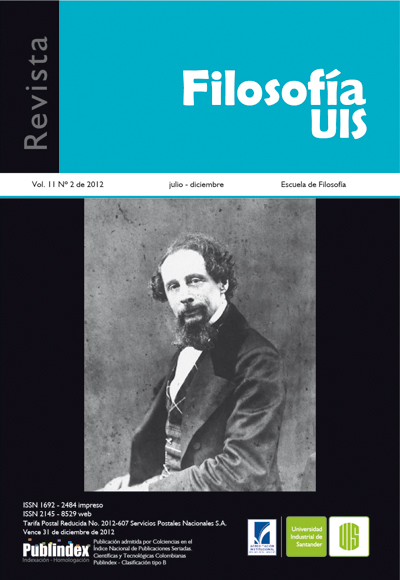Analysis of the figure of “Los Indignados” from Ulrich Beck’s the theory of subpolitic
Published 2012-12-21
Keywords
- outraged,
- technical thinking,
- negative thinking,
- subpolitic,
- rhizomes
How to Cite
Copyright (c) 2012 Fabio Andrés Galvis Gómez

This work is licensed under a Creative Commons Attribution 4.0 International License.
Abstract
The following text intends to be the starting point for a reflection around the political, ethical and social processes derived from the figure of “the outraged”. Our study starts with an analysis of this movement, its origins, its thought and its actions; initially the attention will be focused on the case of Spain and then we’ll give a global view. In this way will be revealed an anxious person who hits bottom but at the same time struggles to emerge from this stage thanks to the rediscovery of itself impelled by the nonconformity, the active and participatory criticism and the interactive communication generated by no-bureaucratic media; the above ends up in practical demonstration of the subpolitic theory of Ulrich Beck.
Downloads
References
- Beck, U. (2002). La sociedad del riesgo global. Madrid: Siglo XXI.
- Foucault, M. (1979). Microfísica del poder. Madrid: La Piqueta.
- Foucault, M. (1991). ”¿Qué es la ilustración?”. Saber y verdad. Madrid: La Piqueta.
- Foucault, M. (2008). Vigilar y castigar. México: Siglo XXI.
- Heidegger, M. (1994). Filosofía, ciencia y técnica. Santiago de Chile: Editorial Universitaria.
- CIBERGRAFÍA
- Bonet, R. (2011). El movimiento de los indignados ¿hasta cuándo resistirán? Recuperado de: http://revistareplicante.com/el-movimiento-de-los-indignados/Consultado el 15 de abril de 2012.
- Castells, M. (2001). Discurso inaugural del programa doctoral sobre la sociedad de la información. Internet y la sociedad red. Recuperado de: http://tecnologiaedu.us.es/cuestionario/bibliovir/106.pdf. Consultado el 29 de octubre de 2010.
- Democracia Real Ya (2011). Manifiesto. Recuperado de: http://www.democraciarealya.es/manifiesto-comun/ Consultado el 4 de octubre de 2012.
- El Mundo (2011). Los “indignados” se hacen oír en Europa y América. Recuperado de: http://www.elmundo.es/elmundo/2011/10/14/internacional/1318610830.html Consultado el 4 de octubre de 2012.
- El observador global (2012). Los “indignados” enfrentan la crisis a su manera.Recuperado de: http://observadorglobal.com/espana-los-indignados-enfrentan-lacrisis-a-su-manera-n48276.htmlConsultado el 15 de mayo de 2012.
- Morgade, C. (2012). Los indignados ¿Revolución o reforma? Recuperado de: http://leyderodriguez.blogspot.com/2012/02/los-indignados-revolucion-o-reforma.html?showComment=1352259276608#c1882923912100792311 Consultado el 4 denoviembre de 2012.
- Ramírez, J. (2004). Deleuze y Guattari: Rizomas. Recuperado de: http://rizomas.blogspot.com/2004/08/deleuze-guattari-rizomas.html?m=1 Consultado el 8 de abril de 2012.
- Simón, P. (2012). Indignados con el sistema. Recuperado de: http://politikon.es/2012/05/16/indignados-con-el-sistema/ Consultado el 4 de noviembre de 2012.
